Copyright is at the heart of the creative industries. Without copyright, creators would have no incentive to create artistic works and businesses would have no incentive to invest in them.
While copyright law is harmonised to some extent through international agreements such as the Berne Convention, there are still notable differences between countries. The focus of this article is on the position under the laws of England.
What is copyright?
Copyright is a form of legal protection that grants the creator or owner of an original work the exclusive right to use and control the work. This means that others cannot use, reproduce, or distribute the work without the permission of the owner.
Copyright protects the expression of ideas that are fixed in a tangible form, not the ideas themselves. In other words, the protection is given to the specific way in which an idea is expressed, not to the underlying concept or thought.
Who owns copyright?
Under English law, the creator of a work is usually the first owner of the copyright. However, there are exceptions to this rule, such as when a work is created by an employee in the course of their employment. In this case, the employer is the first owner of the copyright.
The creator may choose to transfer ownership of the works (the technical legal term is assigned) to another person or business. Alternatively, they may license others the right to use the works while retaining ownership.
What types of work are protected by copyright?
Copyright covers a range of creative works, including literary works such as novels, poems, and plays, musical compositions and lyrics, films, television programs, sound recordings, broadcasts, photographs, paintings, sculptures, and architecture.
It’s worth noting that there are two copyrights to consider in music: the copyright in the musical composition (and lyrics) and the copyright in the sound recording. Both of these copyrights need to be considered carefully whenever you are dealing with music rights.
What is the duration of copyright protection?
The duration of copyright protection depends on the type of work and the country in which the work was created.
In England, the duration of copyright protection for literary, musical, and artistic works is usually the life of the creator plus 70 years.
For sound recordings and films, the protection lasts for 70 years from the end of the year in which they were first published.
However, there are some exceptions to these rules, particularly for works created before 1989.
Does copyright need to be registered?
In England, copyright arises automatically when an original work is created. There is no need to register copyright, as it is an automatic right, provided the work is ‘original’.
It is, however, good practice to maintain records and evidence of any materials or works produced, including when they were created. This will help you enforce or defend your rights.
Do I need to include a copyright notice on my works?
It is advisable for a copyright owner to mark any published copyright material with the international copyright symbol ©, followed by their name and the year of publication. Although not a requirement, it can assist in infringement proceedings.
When is copyright infringed?
Copyright is infringed when someone uses a work that is protected by copyright without the permission of the owner. This can include copying, distributing, performing, or displaying the work.
It is also an infringement to create a derivative work based on a copyrighted work, such as an arrangement of a composition or a remix of a sound recording.
There are a limited set of exceptions to copyright infringement. These are however very narrow and difficult to rely upon.
What are moral rights?
Moral rights belong to the author of an original work and include the right to be identified as the creator of a work when it is exhibited or published, the right to object to any derogatory treatment of their work, the right to avoid false attribution, and the right to control the public distribution of their work.
Unlike copyright, moral rights cannot be transferred or assigned. However, they can be waived (i.e. relinquished). Once waived, an author can’t rely on them, so it’s important to fully understand the implications before doing so.
What are neighbouring rights?
Neighbouring rights are a set of rights that protect the interests of performers and producers of sound recordings. These rights are separate from copyright and are instead known as "neighbouring" rights because they are considered to be adjacent to copyright.
